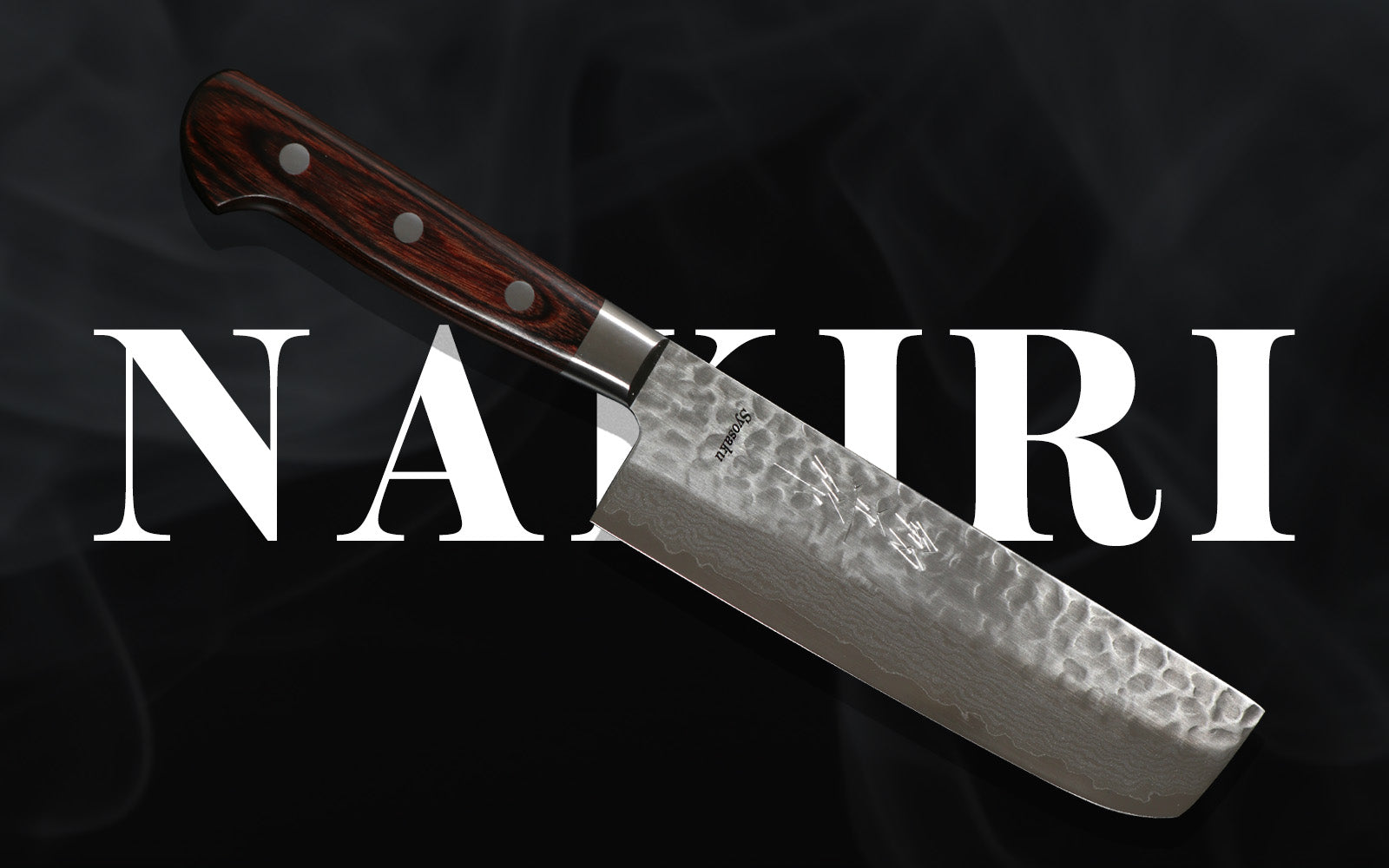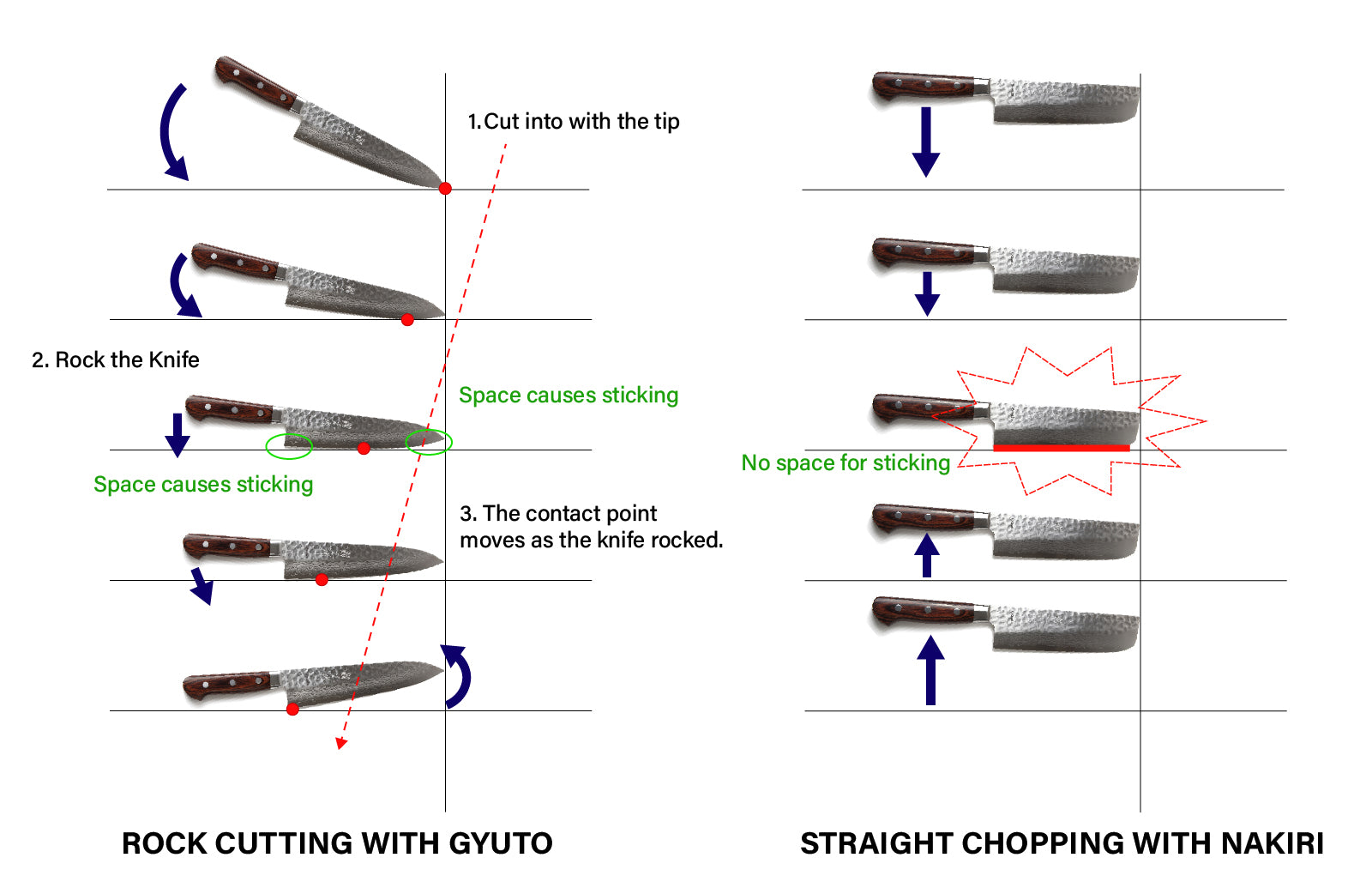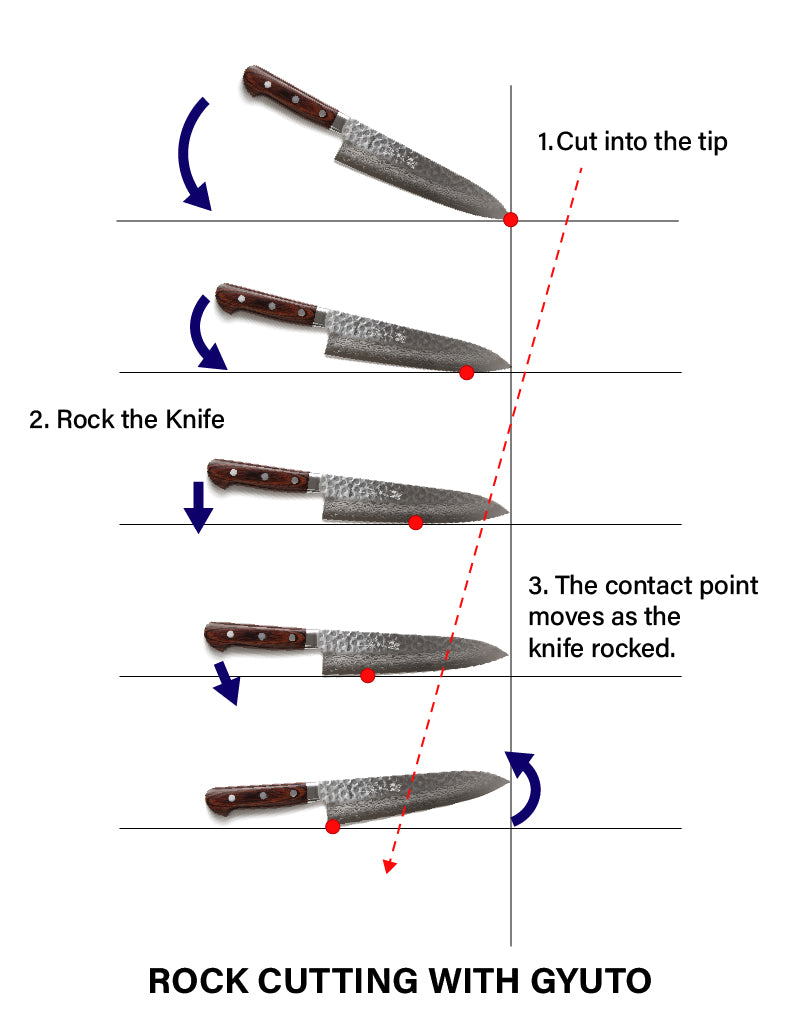
Nakiri Knife
Did you know there are knives designed for cutting only vegetables? They are getting popular worldwide as the veggie lifestyle is spreading. You will know all about the unique Japanese kitchen knife in this article.

1. What is Nakiri knife?
Nakiri in Japanese means “vegetable cutter” or “leaf cutter”. Names and Natures do often agree. They are knives to work only with vegetables.
The Nakiri knife was the most popular knife in the Japanese kitchen before the WWⅡ. Because the main ingredients of daily meals in Japan those days were vegetables.After the WWⅡ, the Japanese started to eat many other foodstuff than vegetables.
This change in the lifestyle made the demand of the Nakiri knife lower. Santoku knife took over the popularity.
You can read about the Santoku knife by clicking the following photo.

But recently, the veggie diet is spreading worldwide. And the Nakiri knife is gaining popularity again in line with this trend. It’s more notable outside Japan, where the knife used to be unknown. More and more overseas customers now show their interests in the Nakiri knife.
I once had a complaint from an overseas customer, saying my Nakiri was useless. But it was because he didn’t know what the knife is for and how to use it. After giving some info and tips, he is very happy with the knife now.
So it’s not a bad idea to learn something about the Nakiri knife, before you decide which knife to choose.
Let’s start!
2. Design of Nakiri knife:
The Nakiri knife is designed to cut vegetables quickly. As you can see the picture below, it has a high flat profile with a straight blade edge.

【Fig.1】Syosaku Nakiri knife
The blade length range concentrates around 6.3 inches (160mm). It’s the right size for handling vegetables without effort. The tip is squared off. It is to prevent the total length too much. They are compact, light, and the blade is very sharp.
Usuba knife is similar to the Nakiri knife. The main difference is the bevel type. Usuba knives are single beveled, while the Nakiri knives are double beveled. You can read the details about the bevel type by clicking the photo below.

Now, let’s see why the Nakiri knife is designed this way.
3. Rock cutting with Gyuto knife:
First, let’s review how you cut vegetables with the more versatile Gyuto (or Chef’s knife). It’s a good starting point to understand the design of Nakiri. With a Gyuto knife, everybody cuts with a rocking motion. Please see the rock cutting with a Gyuto knife in【Fig.2】.
With a Gyuto knife, you cut into with the tip and “rock” the knife. The small red circle shows the contact point with your object or the cutting board. It moves on as you rock the knife. When you finish a rock, one cut completes.
The advantages of the rock cutting are,
(1) You can cut into hard vegetables with the tip.
(2) You can apply more power with less effort, because the contact point is small.
The disadvantages are,
(1) You need to rotate your wrist for the rocking motion.
(2) Each and every rocking motion must be complete. Otherwise, you’ll have pieces stick together by tiny little threads. This is because the blade of the Gyuto knife is not straight (see 【Fig.3】).

【Fig.2】 Rock cutting with a Gyuto knife

【Fig.3】 Rock cutting with a Gyuto knife
You’ll experience it more often with hearty vegetables like cabbage or lettuce. Vegetables high in fiber like celery or green onions can give the problem, too.
4. Straight chopping with Nakiri knife:
Now, let’s see the “straight chopping” with a Nakiri knife in【Fig.4】. You don’t need the rocking motion. All you need is just a vertical up and down of the knife.
Your contact with the foodstuff and the cutting board is not a point, but a long line. This means you have to put more power on your knife. But if you cut only vegetables, it doesn’t matter. When you finish a knife up and down, one cut completes.
The advantages of the straight chopping are,
(1) You can cut more quickly. Because you don’t need a rocking motion.
(2) You can cut with more uniformity. Because the up and down motion is simpler than the rocking motion.
(3) The chance of having vegetable pieces stick together by tiny little threads is much less.
As a result, you can mince vegetables in a few seconds. You can cut them into long thin strips without struggle. It’s easy to get full and clean cuts. You don’t have to worry about squishing or damaging delicate vegetables in a quick work.

【Fig.4】Straight chopping with a Nakiri knife
You’ll need a little training to get used to the straight chopping. But once you get the hang of it, you’ll love the Nakiri knife. It can bring the dish with your vegetables to the next level.
If you cook a lot of vegetables, it’ll be one of your best partners in the kitchen.
5. Other advantages of Nakiri knife:
The Nakiri knife has some other advantages due to the design.
(1) The wider blade helps to scoop up the bulky food you have cut from your cutting board.
(2) The straight blade edge makes “katsuramuki” easier. Katsuramuki is an art of peeling to make a garnish for Japanese dishes. You might have seen a thinly sliced Japanese white radish, or carrot into a long strip.
(3) The straight blade edge is a good starting point for beginners to learn how to sharpen with a whetstone. You need some experience to sharpen a kitchen knife along with a curved blade edge. But thanks to the straightness, it’s easier for beginners. You can polish your sharpening skill while polishing the Nakiri knife.
6. Weak points of Nakiri knife:
The strong points of Gyuto are the weak points of Nakiri.
(1) You can’t cut into hard foodstuff with the squared off tip.
(2) It’s awkward for the rock cutting. You need to get used the straight chopping.
(3) The squared off tip makes it difficult to slice by pulling the knife toward you. You can do it easily with the sharp tip of Gyuto (see【Fig.5】).

【Fig.5】Slicing by pulling the knife
(4) You can work only with vegetables. You need other knives for other materials.
But if you know what the Nakiri knife is for, the above points are not relevant. Be sure what you’ll use the knife for before buying. Otherwise, you’ll be frustrated with these weak points.
7. Nakiri knife conclusions:
The Nakiri knife is a kind of Japanese kitchen knives. It is specifically designed to cut vegetables by the straight chopping. The unique design makes it possible to cut vegetables cleaner and quicker.
It has several weak points. But if you know what the knife is for, you’ll never be disappointed. As the veggie diet becomes popular, it’s getting popular worldwide.
8. Syosaku Nakiri knives:
Syosaku Japanese kitchen knives are handcrafted in Sakai Japan, where more than 90% of Japanese professional chef knives are produced. They are produced one at a time manually by highly skilled master artisans.
We have a range of Nakiri knives. You can pick your favorite from the link below.
CLICK HERE
For more details, send us an email at info@syosaku-japan.com
If you like it, share with the buttons at the bottom of the page.
Thank you!
Toshi
